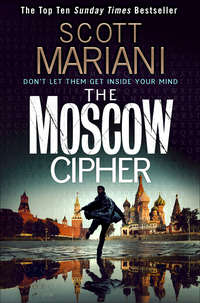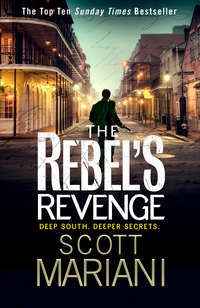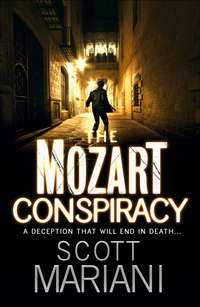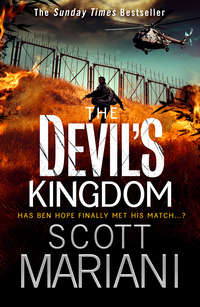
Полная версия
The Babylon Idol
One small consolation was that the media were still in the dark about the details of the shooting incident at the obscure training facility in rural Normandy. The as-yet unidentified victim is believed to be a British national residing in France, with unconfirmed reports suggesting an ex-military connection. The British Ministry of Defence were unavailable for comment. Details of the victim’s condition have not yet been released and the exact circumstances of the incident remain uncertain … SDAT anti-terror officers have said they are involved in the investigation but have not revealed whether the shooting may have been carried out by a member or members of an extremist Islamic group. And on, and on.
The other news item he wanted to check was much more forthcoming on detail, but no more conclusive. INTERPOL’s fury in the wake of Luc Simon’s murder was splashed all over the media, along with gruesome images of the shower unit, post-body-removal, that looked as if a butcher had hung up a live pig in there by its hind legs and slit its throat.
It was no way to go for a good guy like Luc Simon.
INTERPOL were lining up suspects on the working theory that the killing was an act of revenge, carried out either by someone Luc had put away or on their behalf. No charges had yet been brought. Inevitably, the media were whipping up their own storm of speculation that the murder of a high-ranking law enforcement officer was yet another terrorist atrocity. Ben wouldn’t have been surprised if, in the next day or two, the cops pinned it on some claimed Muslim fanatic they found on an intelligence watch-list, complete with the ‘discovery’ of maps and photos of Luc Simon and his home in the suspect’s apartment, along with the requisite anti-West hate literature and bomb-making materials under his bed. And maybe they’d be right. But Ben didn’t think so.
Next he tried Roberta’s number, but her phone was switched off. Then he tried Pascal’s landline number once more for luck, and gnashed his teeth in frustration until the dial tone went dead. So much for the communication age.
But at least someone was answering their phone. The third number he tried, he got a reply after three rings.
‘Dr Lacombe? It’s Ben Hope.’
‘This is why I don’t generally give out my personal number,’ complained the sleepy voice on the other end of the line. ‘Do you know what time it is?’
‘How is he? Any change?’
‘There hadn’t been, when I came home to get some sleep. They haven’t called. So, no, none.’
‘I’m sorry if I woke you, Doctor.’
‘It’s okay. And you can call me Sandrine.’
‘Are you alone, Sandrine?’
‘What kind of question is that?’ she said sharply. ‘Yes, I do happen to live alone, for your information. Did you call to ask me on a date or something?’
‘Not exactly,’ Ben said. ‘The reason I asked is because I need a favour.’
‘What kind of favour?’
‘The sensitive kind that needs to be strictly between you and me. One that concerns Section Forty-Five of the French Code of Medical Ethics.’
‘I see. Regarding patient confidentiality?’
‘Specifically, the matter of releasing a victim’s identity to the media. Or not releasing it, more to the point.’
‘And you have some reason for having it kept quiet, I suppose.’
‘I have reason to think the shooter got the wrong guy, but doesn’t know it yet. I’d like that knowledge to be kept from him for as long as possible. Now you understand what I meant by sensitive.’
A rustling sound as she sat up in bed, fully awake now and unlikely to get any more sleep that night. ‘What are you telling me here? If he was the wrong guy, then who was the intended target?’
‘Let’s just say if they’d succeeded, it would have been a little hard for me to call you.’
‘Someone tried to kill you? But who?’
‘A dead man,’ Ben said. ‘Or so people believe. If he isn’t one already, he soon will be.’
‘Do the police know this?’
‘They’re fixated on their own ideas of what this is about. If I told them I thought I was the target, I’d spend the next week sitting in an interrogation room being hammered with all the questions they can’t ask Jeff.’
‘Where you’d at least be safe.’
‘But other people wouldn’t be. And I can’t have that. So no, I have no intention of telling the cops what I know.’
‘This is just plain crazy. Things like this don’t happen in my world.’
‘Things are a little different in mine,’ Ben said.
‘I can’t be drawn into this intrigue,’ she said. ‘Have you seen the news? The story’s getting bigger by the hour. I’m a doctor, not a spy. There are rules, you know?’
‘I understand. Forget I mentioned it.’ He was about to end the call when she said, ‘Hold on, don’t go.’
‘I’m still here.’
There was a pause on the line, followed by a sigh of resignation; then she said, ‘To reply to your question, the answer is no, I haven’t signed off on that disclosure, and can’t, without the consent of the victim or their next of kin, which I haven’t got at this point. If this was an instance of, say, rape or child abuse, where there’s a clear case for withholding the victim’s identity, that’s one thing. But where a violent crime has been committed involving firearms, especially in this day and age—’
‘The media are hungry for all they can get and the police can release the details themselves, I know. They haven’t yet, but it could all change by morning. I was hoping you could exert some professional influence.’
‘When you said you wanted a favour, you weren’t kidding.’ She heaved another sigh. ‘All right. I can try to delay things from my end, but probably not for more than a day, maybe two. And I know someone who knows someone in the police media liaison department. It’s possible that I can pull a few strings there, too, assuming I can come up with a plausible-sounding reason to persuade them. It won’t be easy.’
‘Whatever you can do, it’s appreciated.’
‘I can’t promise anything,’ she warned him. ‘I don’t even know why I’m agreeing to this.’
‘I’ll bring you a big bunch of flowers.’
‘Your friend needs them more than I do.’
‘He’s not really that into them.’
‘You take care,’ she said. ‘Don’t do anything stupid.’
‘Why change the habit of a lifetime? I’ll be in touch.’
Chapter 13
Ben sped on southwards through the night. As he drove, he made one last call.
The kind of help Ben needed to ask for next could only be had from certain highly specialised quarters. And sixty-odd-year-old former sergeant Boonzie McCulloch, once Ben’s military instructor, later his friend and mentor, long since retired to an idyllic rural life in Campo Basso but still with a few fingers in a few pies, was just the man to go to.
Along with the rest of the world, Boonzie had seen the news about the shooting at Le Val and had been just about to call when Ben beat him to it. The Scotsman’s shocked silence quickly turned to molten anger as Ben described Jeff’s condition. ‘If I’m right, whoever did this is after me. And the moment it leaks that they got the wrong guy, they’ll be back.’
‘Aw, fuck this for a game of soldiers,’ Boonzie’s gravelly voice rumbled over the line. ‘I’m on ma way. Tonight, reet noo. I’m gettin’ in the car and I’m comin’.’ It was like letting a rabid pit bull off the leash. Ben could almost hear the phone cracking in Boonzie’s iron fist.
‘That’s not what I want,’ Ben said firmly, reining him in. ‘I’ve already dragged you into too much trouble in the past. I’ll deal with this my way, alone. But I could use some backup.’
‘Say the fuckin’ word, laddie,’ Boonzie rasped, wanting blood.
‘I need six guys. I was thinking maybe McGuire, Fry and Blackwood, if they’re available, plus three more. How fast can you get a team together for me?’
‘For you? They’ll be trippin’ over themselves tae help, son. And woe betide these murderin’ basturts when we get oor haunds on them. Leave it wi’ me. I’ll get back tae ye asap.’
By the time Ben had reached Limoges in west-central France, it was all arranged. Within a few hours three good ex-regiment men would be rolling up at Le Val, two of them flown in from London and the third from Germany where he’d just finished a VIP close protection stint. They’d be heavily armed, and they wouldn’t need to use the main gate. Their mission: to back up Tuesday and the others in case the bad guys tried to strike again. Meanwhile, another trio urgently summoned in from various parts of Europe would speedily converge on Cherbourg, where they’d station themselves in and around Louis Pasteur Hospital to spot, intercept and detain anyone suspicious who might come snooping in the event of an information leak.
Sandrine Lacombe would flip if she knew her place of work was under guard by professional hard men with guns. But the good doctor would never know. Unless something happened – in which case all hell might just break loose.
With his insurance policy in place as best he could arrange it, Ben stormed on through the night. The Alpina ate up the distance as he carved southwards on the A20 motorway. Driving, driving, driving. A cold stream of wind whistling from the cracked-open window. The heater blasting, the radio blaring. Fists clenched on the steering wheel, eyes wedged open against his growing fatigue and burning with anger as he thought about Jeff lying there in that hospital bed and about Luc Simon in the morgue. When his thoughts turned to Father Pascal, to Anna Manzini and Roberta Ryder, frustration and impatience scoured him like acid and he willed the car to go even faster.
From Limousin he passed into the Midi-Pyrénées. A while later the signs for Toulouse flashed by. He left the motorway and veered south-east into Roussillon, then due south from Carcassonne, deep into the rugged landscape along ever narrower and twistier roads, slippery with ice, that led him up dizzying mountain passes where the ruins of medieval castles stood silhouetted on craggy snow-capped peaks against the winter sky; then plunged steeply down into green pine valleys, through small towns and villages and hamlets too small to feature on the map. Couiza, Quillan, Montségur. He passed within a couple of kilometres of the villa that had been Anna Manzini’s base for her research on ancient Languedoc history and the mysteries of the Cathars. The same villa where Franco Bozza had almost managed to kill her.
Being back here again for the first time since that summer brought back memories he’d thought he’d left far behind him: he and Roberta Ryder dodging bullets and chasing clues all over the Languedoc; the deadly running pursuit on which Usberti’s hired killers had led them; playing tag with Luc Simon and an army of police; finding Anna battered and unconscious after Bozza’s attack; the final bloody standoff with Bozza in an underground cavern buried deep in the heart of a mountain. And Ben remembered the kindness that Father Pascal had shown him when he’d turned up on the priest’s doorstep, badly hurt. The old man had been more of a father to him than his real one ever had. The memory sent a painful stab of guilt deep inside Ben as he replayed those images inside his head.
He should have done more to stay in contact. But keeping in touch with people who had been important in his life had never been one of his greatest talents.
If you ever find yourself in Florence, you must give me a call.
In the desert of life, you are my mirage.
Running off when people need you around is what you do best, after all.
Their voices echoed in his mind. He’d let them all down. For that, he was truly sorry.
Soon, his speeding headlights lit up a road sign for the village of Saint-Jean. Dawn was still a couple of hours away. He’d made good time.
The village was still more or less as Ben remembered it – a few new houses might have sprouted up at its edges, and more of the ancient red-tiled roofs were incongruously decorated with recent add-ons like solar panels and satellite dishes. He passed the drystone wall that had been painted with blood from his gunshot wound, then winding deeper into the village he passed the little church in which he’d prayed alone in the dead of night; then he saw the graveyard, and beyond it the slope of scrubland leading up the hillside where Pascal tended to his vines; and then he saw the priest’s cottage. The same old pale-blue Renault 14 was parked in the narrow, winding street outside. Ben’s spirits brightened seeing it, knowing it meant Pascal was at home.
He pulled the Alpina up at the kerbside and got out. Looked up at Pascal’s windows, dark and shuttered like every other window in Saint-Jean. The cold stillness seemed to hang over the place like a shroud, and he shivered. He didn’t want to wake Pascal, and thought about sitting a while longer in the car, but changed his mind, walked up to the door and knocked softly.
There was no response after a couple of minutes, so Ben made his way around the back, through the neat yard, past the henhouse. A goat bleated from somewhere in the darkness. The back porch was open. He creaked the door ajar and stepped into the narrow hallway. He smelled the rich cherry and vanilla tang of aromatic pipe tobacco that had soaked into every crevice of the old stone walls. An antique case clock ticked steadily, sonorously from within. He called out softly, ‘Father Pascal?’
‘Arrêtez!’ The voice behind him made him tense and whirl around. Yellow torchlight shone in his face and glinted off something that Ben instantly recognised as a wartime French service revolver. One that was pointed right at him.
Ben froze and put up his hands. Normally, when faced with a firearm aimed in his face, he would have done either one of two things: move in faster than a striking cobra and take control of the weapon, breaking the fingers of the person holding it. Or, if that wasn’t tactically favourable, he would have drawn out his own gun and fired first. And so far in his life, Ben had always been quicker.
But he wasn’t about to do either of those things when the person with the gun was a little old woman as frail as a sparrow, so frightened that the weapon was fluttering in her skinny hand. ‘Who’s there?’ she quavered.
‘Don’t shoot,’ he said in French. ‘It’s all right. I’m a friend of Father Pascal. My name’s Ben.’
The woman hesitated, then reached tentatively out and clicked on the wall light. She was in her seventies, with thinning grey hair, wearing a dressing gown topped by a shawl draped around her shoulders. Her eyes were reddened as though she’d been crying.
‘I couldn’t sleep,’ she said. ‘I saw the car lights. I thought perhaps they had come back.’
‘You thought who had come back?’
‘Those men. The men who—’ Her voice trailed off. She sniffed.
‘You don’t have to point the gun at me,’ Ben said, eyeing the antique revolver and her finger on the trigger. It might be a relic, but if it had been good enough to kill Germans in two world wars, he didn’t want to be on its business end. ‘I promise I won’t hurt you. Where’s Pascal? What men are you talking about? Is everything all right?’ But it obviously wasn’t. He sensed something was terribly wrong.
The gun drooped in her thin hand, pointing at the floor. The old woman’s eyes filled with tears. And now Ben knew for sure, and he felt his own shoulders sag.
‘When?’ he asked.
‘Two days ago.’
‘What happened?’
‘There was an attack. At the church. The police think it was two intruders. Nobody knows. Nobody saw anything.’ She sniffed again, and shook her head. ‘Pascal … I knew him all my life. And now he is gone.’
Ben’s throat was so tight that he could barely speak. ‘What did they do to him?’
‘They beat him. They killed him, les salauds. The funeral is this morning.’
Ben was numb as he walked back to the car. He watched the old woman disappear inside her house, her head bowed. He sat and smoked, letting his mind become empty.
Dawn came; the sky lightened in gradual shades. A fog hung over the mountains in the background. The old woman reappeared, dressed in boots and a coat. If she was still carrying the gun out of fear that the attackers might return, it was hidden in a pocket. She let Pascal’s hens out and fed them, moving stiffly in the morning cold. Seeing Ben sitting there in his car, she came over with a sad smile and asked if he’d like to come inside for coffee. He said no, thanks, and apologised for having scared her earlier. He told her the men wouldn’t be back, and that she shouldn’t be afraid.
There was nothing more to say. Nothing more to do here. He’d be on his way, after the funeral.
At ten o’clock in the morning, Father Pascal Cambriel was laid to rest in the graveyard of the church of Saint-Jean where he’d spent so many years caring for his community. Many had turned out to pay their final respects to the much-loved priest they’d known all their lives. Ben stood at the back of the crowd and watched with a clenched jaw as the coffin went into the ground. There were tears and sobs. A younger priest drafted in from a neighbouring town said a few solemn words. Ben spoke to nobody.
He was the last to leave the cemetery. As he knelt alone by the fresh grave, he made his promise. Then, slowly, calmly, he walked back to the car and drove away, never to return to Saint-Jean.
Gentle, kind Pascal wouldn’t have approved of the vow Ben had taken at his graveside. But Pascal hadn’t lived in Ben’s world and had only the smallest understanding of what motivated evil men and the cruelty they were capable of. Those were things Ben understood very well indeed. And whoever was doing this, whoever was hurting his friends, he was going to track them down, and find them, and destroy every single one of them.
They wanted blood. They were going to get it.
Chapter 14
‘Gennaro, you are a gift from God.’
When Massimiliano Usberti had uttered those words six months earlier, he’d meant them literally. For a man of such profound religious faith as his, there had been no other way to describe an event so serendipitous. It was the act of Divine providence he had been praying for. Now that it had come, with it came the long-cherished opportunity to start putting his plans into action.
He’d been waiting a long time.
Life was quiet when you were a disgraced former archbishop. Too quiet. For years, Massimiliano Usberti had seen almost nobody, spoken only to the small band of faithful disciples who hadn’t abandoned him since his fall from grace. And what a spectacular fall it had been. The pain and humiliation of his rapid, sudden descent remained with him every waking moment. His private retreat, the villa set into its own four acres on the shores of Lake Como, was his only comfort, though for all its opulence it was a far cry from the magnificent Renaissance palace outside Rome that had been his main residence at the peak of his career as a senior archbishop.
Back in those halcyon days, it had seemed as if nothing could stop him. He’d been on track to become a cardinal. One day, perhaps even Pope. Anything, everything, he dared to dream felt within his grasp. Gladius Domini, the Sword of God, his brainchild, his life’s work, had secretly attracted powerful investors from every fundamentalist Christian enclave across the world and mighty friends in China and the USA. Its goal: to re-Christianise the globe and destroy once and for all the rising Islamic threat that was spreading everywhere like a cancer; to bring about a new golden age of holy crusade against the heathen menace in the East. Its mission statement was Necos eos omnes. Deus suos agnoscet. Or, in layman’s terms, ‘Kill ’em all and let God sort them out’.
When the crash had come, thanks to the combined efforts of Usberti’s enemies, the blooming flower that had been Gladius Domini had been trampled into the dirt. All but a handful of his powerful friends in high places had deserted him in the wake of the disaster. The investors had dropped him like a hissing stick of dynamite and run a mile. His dreams had crumbled into ashes as he escaped imprisonment by the skin of his teeth, letting minions like the hapless Severini take the fall in his place.
And so, with his power hugely diminished, his ambitions crushed and his once-substantial wealth slowly eroding, Massimiliano Usberti had become a virtual recluse. No longer the proud, physically imposing, leonine man he once had been, he grew scraggy and wrinkled and started paying less attention to his personal appearance. He lost interest in food and gained a little too much interest in strong spirits. His beloved motor yacht, in which he’d once merrily sailed the sparkling blue waters of Lake Como, no longer held any joy for him. He would sometimes be confined to his bed for days on end by fits of black depression from which not even his new assistant, a devoted young priest called Silvano Bellini who had joined his shrivelled retinue a few months earlier, could rouse him.
When he did take Bellini’s advice to get some fresh air and exercise, all he could do was pace restlessly about the lakeside estate, brooding and muttering to himself. Indoors, he became glued to the internet, obsessing over the state of the world. Was he the only one who could see how desperately, now more than ever, God’s guiding hand was needed to avert the catastrophic decline of civilisation? The more he scoured the web for fuel to feed the fire burning inside him, the more evidence he saw of the entire globe’s descent into ruin: heading faster and faster towards utter degradation as the situation that had seemed untenable even at the height of Gladius Domini’s glory days now seemed to spiral ever further into complete chaos.
Usberti was convinced that the age of Sodom and Gomorrah was returning in modern times exactly as prophesied in Scripture, bringing with it a plague of abominations that were the sure signs of the approaching apocalypse. The holy institutions of family and marriage breaking down. Promiscuity and drugs, pestilence and mental illness everywhere, perpetrated and encouraged by a subculture of corrupt intellectual elitists who had turned their back on God’s wisdom and taught others to follow their disgraceful example. Men marrying men now, heaven help us. What next, sheep and goats? As if that perversion were not gruesome enough, barely a day seemed to pass without Usberti wanting to throw up at the sight of yet another aberrant bearded transsexual being fêted by the online media. The Western world was in the throes of lunacy, celebrating bestial sin and surrendering to all manner of vile unnatural passions and self-obsessed neurosis, even as the invading enemy hordes came flooding through their open borders: a never-ending army of so-called refugees bringing with them a wave of crime, rape and violence perpetrated against the decent Christian people who had welcomed them into their lands. Roaring in like a rogue wave, the heathen invaders were set to colonise all of Europe and beyond, one nation after another. The weak, ineffectual puppet governments of those countries, paralysed by the spell of political correctness and terrified of committing what the propagandists defined as a ‘hate crime’, would simply stand back and do nothing, until the faithless and dissolute West ultimately fell to the invasion of Islam and Shariah law.
Needless to say, Usberti had seen the whole ugly mess coming a long time ago; nobody had wanted to listen to his warnings and now it was almost too late to stem the tide. It was left to a brave few to fight back, and Usberti yearned to take his place at the head of a righteous campaign to restore sanity and godliness to the world. But what could he do? His money was dwindling, his influence was dead and his name was a joke.
However badly his frustration over the state of human affairs consumed him, it was his bitter hatred of his personal enemies that ate deepest of all into his soul. He spent hours daily plotting all kinds of bitter revenge against those who had engineered his downfall. One in particular: Ben Hope.







